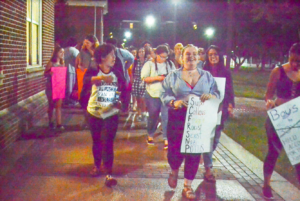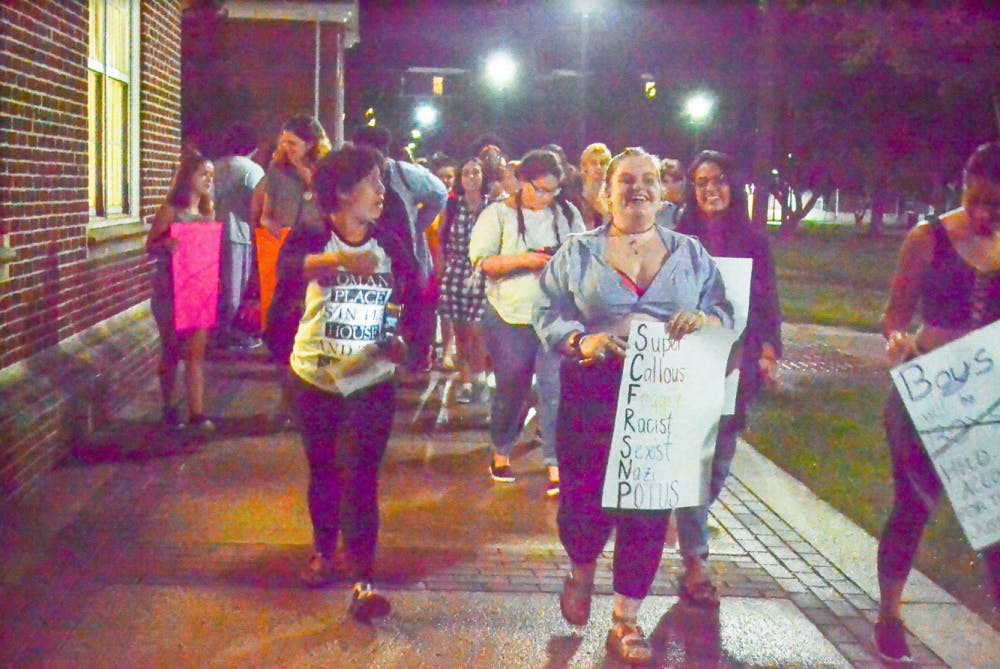By Alyssa Louis
Correspondent
A revealing dress does not give consent. A woman walking down the street is not giving an invitation to be harassed. Going to a party does not imply that she is “asking for it.” These misconceptions are not excuses for sexual assault, according to Slutwalk participants dressed in everything from form-fitting dresses and skirts to jeans and T-shirts, accurately depicting potential victims of sexual assault — everyone.
Students marched through campus on Tuesday, Sept. 5, to shed light on the growing stigma of sexual harassment and abuse in the fifth annual Slutwalk, hosted by the Women in Learning and Leadership.
Slutwalk carried “more intensity” than previous years, according to Rosie Driscoll, a WILL member executive chair and a senior history and women’s, gender and sexuality studies double major.

Driscoll noted the students have grown louder each year as they proudly chant while marching through campus.
The event’s guest speaker Emily May, the co-founder of Hollaback and a feminist, delivered an honest reminder of the world women live in.
“Guys live in a different city,” May said, in regard to the differences between the fears of men and women. While a woman is afraid to walk alone at night and always has her guard up, a man may not have to be as cautious, according to May.
As the co-founder of Hollaback — an online community for victims of sexual abuse which allows them to share their experiences and work through conflicts — May has devoted her life to providing an egress from harassment, rape and other traumas.
“I pretended it didn’t happen, but the real story is that it shook me to my core,” said May, as she recounted her struggles with street harassment.
Those in attendance convened in the basement of the Business Building. May asked those in attendance to raise their hand if they’ve ever been harassed in the street, followed or groped.
Many hands were raised in the air, demonstrating just how many people have sustained these often suppressed or habitually tolerated experiences.
“I wasn’t the only one that felt silenced by it,” said May, as she described the exchange of harassment stories among friends.
A band of young women and men then marched out of the basement, not only to inform people of sexual exploitation, but to represent the victims that have suffered or lost their lives.
As students proudly marched through campus, those passing by often showed their support by simply smiling, joining the chant or taking a video.

Slutwalk originated in Toronto and was created to protest a police officer’s belief that “women should avoid dressing like sluts in order not to be victimized,” according to a CBC News Toronto article from April 2011.
These marches provide a safe environment for those to express themselves freely, providing women the opportunity to wear clothing they may shy away from in fear of slut shaming.
Jesse Troiano, a senior marketing major, expressed his understanding of the harassment and rape culture on college campuses and the need for people to take initiative to end it.
“It is so prevalent and guys need to show their support too,” Troiano said.
Slutwalk’s purpose is to give victims a safe haven to share their stories and make the public understand that sexual assault is not something to be tolerated.
The College’s students that assembled were peacefully confronting the stigma that women are supposed to “adopt the problem,” according to May.
Maggie McCreesh, a new member of WILL and a freshman political science major, believes that Slutwalk “help(s) with solidarity and remind people that they are not alone.”
Actions can speak louder than words. Slutwalk is bringing the misinterpretations and negative stigmas of sexual abuse to the surface simply through strides.







